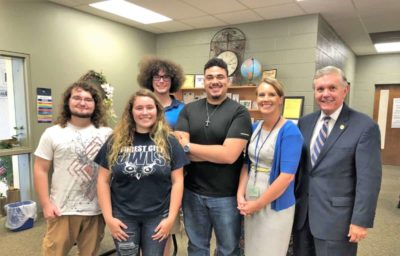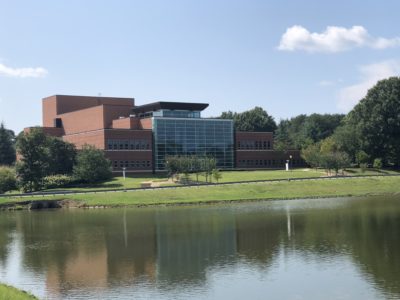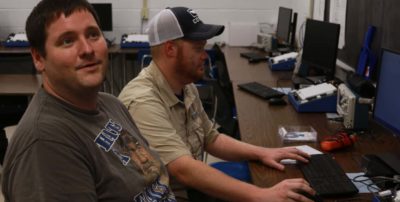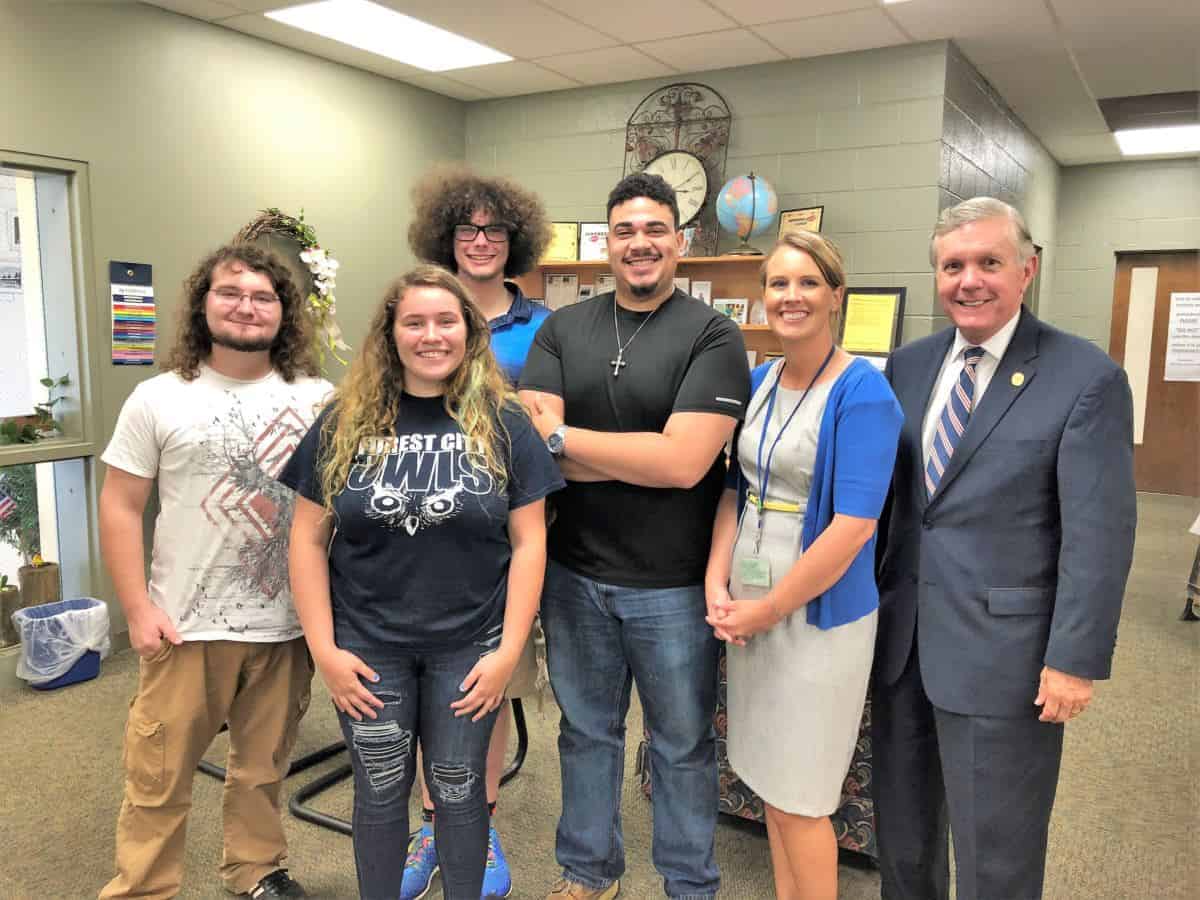

“These colleges will be there to meet the challenge of change.”
W. Dallas Herring
Jan. 29 is Walter Dalton’s last day as president of Isothermal Community College. In a recent interview, the former lieutenant governor talks about community colleges’ obligation to react to change and reflects on how Isothermal Community College became a beacon of hope during the Great Recession.
Dalton announced this summer he would retire from Isothermal Community College (ICC) after serving as president since 2013. I recently had the opportunity to chat with Dalton about his lifetime of public service, his tenure as president of ICC, and his role in education in North Carolina. You’ll find a portion of our interview below. It has been edited for length and clarity.
I should note, this particular interview is quite special to me. In 2016, Dalton hired me to serve as the college liaison for high school programs at ICC. And while I’ve since transitioned out of that role, his leadership and guidance made a lasting impact on me both personally and professionally. He said during the interview that “Personnel is policy,” and I can attest that he embodies those words – leading, guiding, and pushing folks to be the very best they can be.
Emily Thomas: Thank you so much for speaking with me. It really is an honor to conduct this interview. I’m glad Nation passed the baton to me.
Lt. Gov. Walter Dalton: Thank you. I look forward to talking with you.
ET: To begin, can you reflect on some of your proudest accomplishments as president of Isothermal Community College?
WD: Looking at more of a general sense, I hope and think that I’ve helped lead the college, work with people, listen to people, and inspire in them a can-do attitude. And because of that, I think we have done some great things. We’ve implemented some new programs with agribusiness, human services technology, and a new dental assisting program.
Dallas Herring once said, “These colleges will be there to meet the challenge of change.” There’s the micro change of students that come here. They’ve never been to a college. Their life is changing. They may have gotten married. They now have jobs. So, we help them adjust to that change. But there’s a macro change in the economy. We saw that with the Great Recession. And now, we’re all dealing with COVID.
As a community college, we have an obligation not only to react to those changes, but to be proactive and try to get out front.
Walter Dalton
That’s the reason we implemented some of these new programs. We were a textile community, by and large, and now we have new entities like Tryon International Equestrian Center (TIEC), and it has changed our economy. We’ve got a new engineering technology workforce development building that is state of the art. I am very proud of that.
I’ve always encouraged our faculty and staff to engage at the state level. They participate with the community college conference every other year and have also conducted presentations with SACS (Southern Association of Colleges and Schools). So again, I think my biggest contribution, hopefully, is to instill in [the faculty and staff] this can-do attitude and go beyond their bounds to make this a better place. And I think they’ve done that.
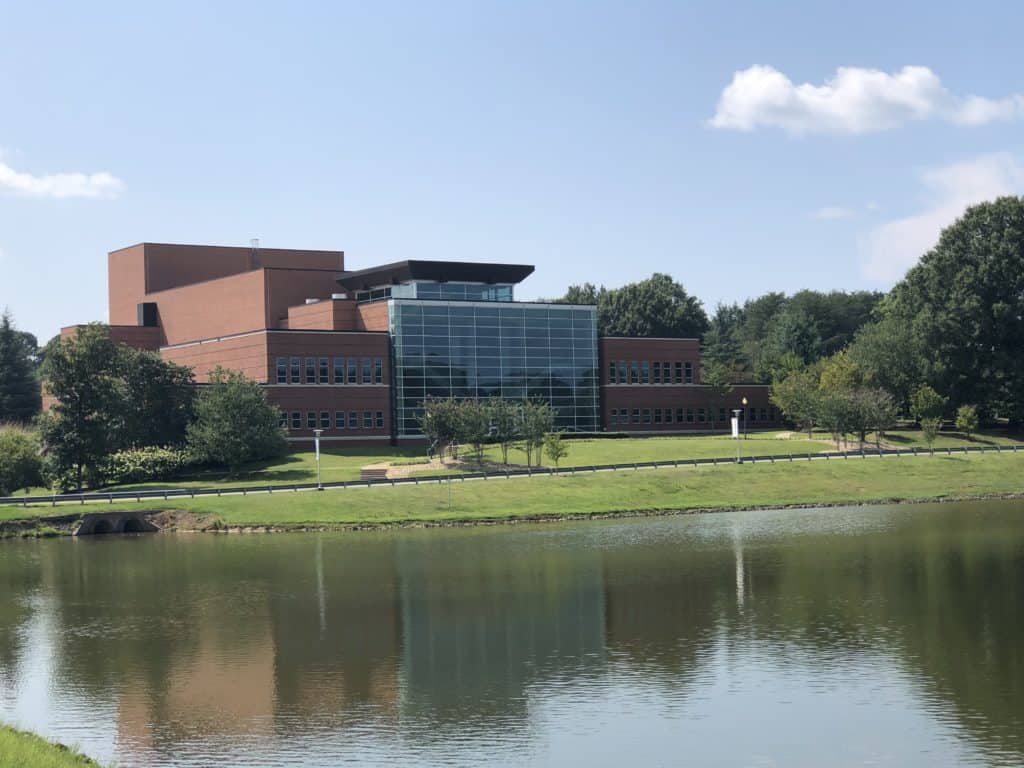

ET: Tell me about some of the work you weren’t able to complete while you were president of Isothermal Community College.
WD: One has just started, but I’ve been working on it for two years, and ultimately this may be one of the accomplishments I’m most proud of. We received a grant from Appalachian Regional Commission (ARC) to do an international program. My idea was that we would partner with a local industry that is also a global industry. The industry would identify real-world, industrial problems, and our students would work with the industry to solve that problem in collaboration with their employees or other students in Europe.
We partnered with the company Trelleborg, a Swedish company, traded on the New York Stock Exchange. It’s a $3 billion company that manufactures in 50 countries. The company manufactures a lot of products, but what they do here is rubber coating fabric that is used a great deal in the aeronautics industry. We are just beginning this program, although COVID has delayed that to some degree.
But I think when we look at the economy today, it is a global economy. Think about it. The skills to manufacture rubber coated fabric in Rutherfordton, North Carolina are no different than the skills of manufacturing that in Milan. But there are cultural differences and sometimes, there’s measurable differences. So, if we can train workers to engage in a global economy and industry sees a certification that can travel worldwide, I think it makes North Carolina a more attractive place for businesses and industries to locate and expand. I also think it will help us attract some of that supply chain to our area.
We also got a grant through ARC to do a study in conjunction with NC State and an Equine Research Center. There’s about four phases of that, and we are in the first phase on our campus with the new programs we have in equine. I’m going to be looking at those to see how they mature. We think that there will be demand for those jobs, and I’m excited about that.
You know, we’ve done a lot of repair/renovations of the buildings since I’ve been here. Every building now has a roof that is under warranty. We’ve got HVAC needs that are being addressed. Those aren’t the most exciting things to talk about, but they’re absolutely essential.
There is attractive land near our performing arts center – four or five acres – that would be perfect for a hotel or motel to locate with a restaurant. We’ve had discussions. I’ve tried to attract people there. That area really can adapt well into a full-fledged conference center and have a regional scope. We do a lot of regional events there anyway. I think it’s the nicest performing arts center west of Charlotte. It really is beautiful.
I look forward to seeing those types of things continue to evolve. I’m very excited about the international program and think that we have some opportunities down the road to create that kind of relationship in our equine programs.
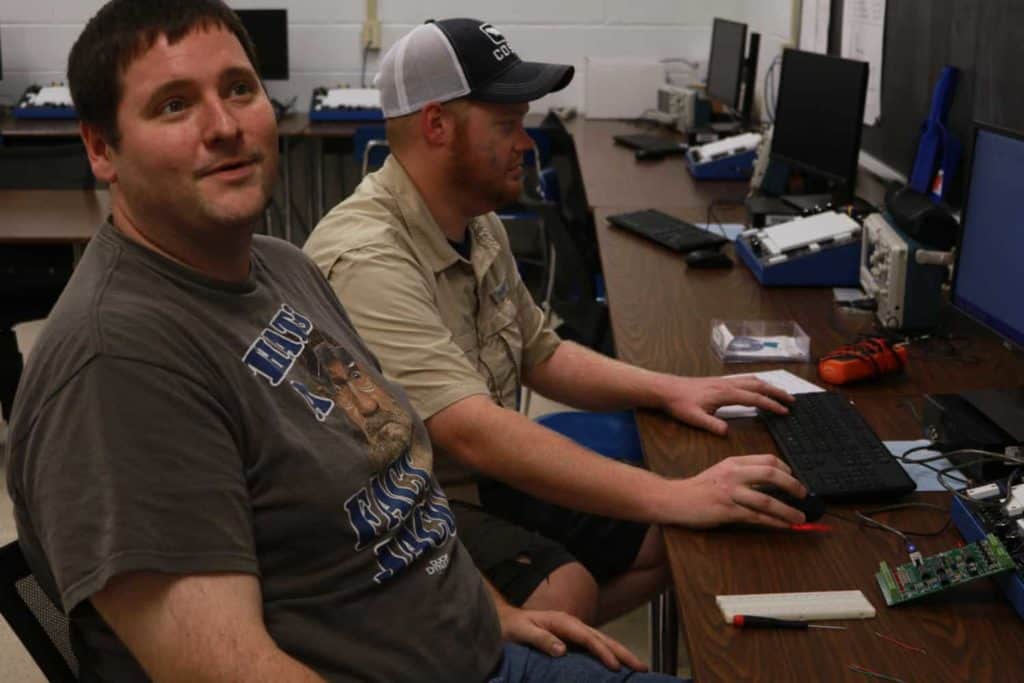

ET: What were some of the biggest challenges you encountered as president of ICC?
WD: We were coming out of the Great Recession, and the four county area of our Council of Government (COG) had the highest per capita job loss of any COG in the state of North Carolina. We were really devastated.
The biggest challenge, really, was to instill in people a belief of hope.
Walter Dalton
We got to 17% unemployment at one point in time. And even though we had some companies like Facebook located here, there were not that many jobs and people were really depressed. As we came out of the recession, and this is true not only of Isothermal but of all community colleges, we were the beacon of hope. And if there’s going to be hope in the future, it’s going to be in obtaining greater skills – greater education to move forward. So, instilling in the people the idea that life can be better.
To build up the hope of the community at the college, I think, was one of the biggest challenges we had. And I think we were doing that. Things were bubbling back. Our enrollment started coming back. The new programs were exciting to people. Then, COVID hits.
COVID has certainly been a big challenge for us, and we have survived that, I think, very well. But it was really disconcerting to see COVID come along at just the point in time that I felt we were getting back up off the mat. We were making progress; people were upbeat about their future. And then, COVID hit.
ET: I know you had a lot to do with early colleges very early on. Can you talk to me about your thoughts on early colleges and their impact?
WD: I think they’ve had great impact. Back in the early 2000s, I was named as part of the Governor’s Education First Task Force under Gov. Easley. I was, at that point, education chair in the Senate. We had 25 proposals out of that task force, but one of them was to implement and develop early colleges. Greensboro, out of Guilford County, had done something similar, but it was a one off. There was no statewide initiative.
So, I began drafting the bill. We had heard a presentation of someone from [the Bill & Melinda Gates Foundation], and I felt like it accelerated the learning and actually upped the rigor because you’re asking more students [to complete] in a shorter period of time. It should save money in the long run and better prepare students for the 21st century economy.
I think there’s over 133 early colleges in North Carolina. Last time I checked, we had about one third of the early colleges in the nation. North Carolina and Texas very much stand out, but more importantly, the data and results of early colleges have been outstanding. And the accomplishments have been outstanding.
The second iteration that I was involved in with early colleges was something called the JOBS Commission: Joining our Businesses and Schools. We developed that when I was lieutenant governor. It’s this idea of marrying education to an industry.
What we tried to do was theme early colleges on a regional basis. At that time, there were seven economic development regions in North Carolina. One we did was in Fayetteville, North Carolina, where the military is the biggest business. We were also very involved in the Wake STEM Early College, along with Dr. Louis Martin-Vega out of NC State. Wake STEM Early College focuses on the “Grand Challenges of Engineering.” In 2019, they were named the number one magnet school in the nation. And there was one in northeastern North Carolina. Local farms was the business entity we partnered with, and there were five school systems involved in that.
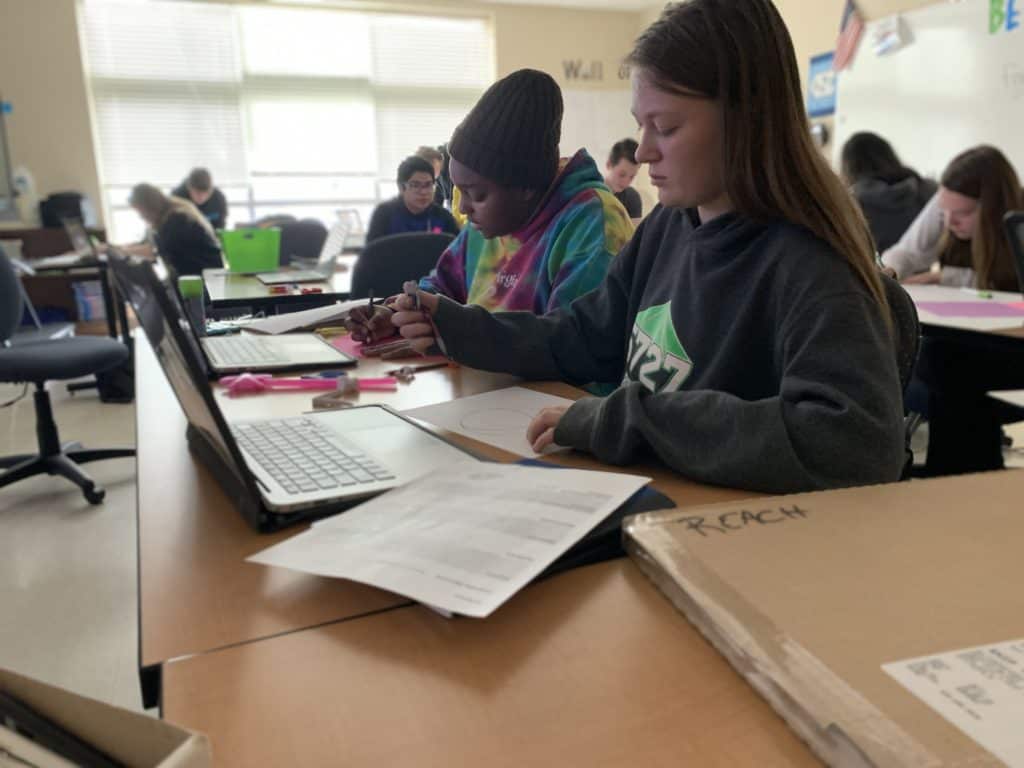

And looking back on it, with 133 early colleges, you say, “Oh, well that must have been easy to do.” It was not. There was a lot of opposition – a lot of challenges. I remember being on a conference call and one of the superintendents said, “Well now who’s going to get credit for the scores in the early college if they’re coming out of our various systems,” and I said, “It can be arranged that you get credit for the scores. But based on what you just said is the reason we need to do this, because by your comment, you think this is going to be a success. Now why would you want to hold your students back from that success?”
But time ran out on us. We were working on some others, but the four years went very quickly. We had to get the JOBS commission implemented, we traveled the state, we heard phenomenal stories about early colleges, and the benefits they were having.
In my opinion, the next iteration should be how do we take that to scale? We now have 26,000 students or more in early colleges. I really think the next movement should be to do what I call an academy approach.
As you know, at Isothermal, we have business sciences, applied sciences and engineering technology, health and public services, and arts and sciences. We’ve got four major departments. If we had an academy for each one of those that links into the public schools with Career College Promise, you could then drill down and go into more specialization if you want to. But I think if we had the academy approach it would very much mirror what we do in early colleges, which have been very successful.
If you look at the high school graduation rate in the last 10 to 12 years, it has continually gotten better in North Carolina. It is a very steady acceleration. I think early colleges and Career and College Promise have had a huge impact on that, and the greater interface and connection between the colleges and the public schools I think is a great part of that. I’m very proud of what’s happened with early colleges.
The key is to keep it going down the road with what we’ve got and build on it. And actually, I think it should save money. If you look at myFutureNC, myFutureNC says, “We’re going to have 2 million North Carolinians with a high-quality degree or credential by 2030.”
Well, that means we are saying that everybody needs something beyond high school. Maybe not everyone needs a four-year degree, but they need that credential. Well, that’s what early colleges are really doing. You’re accelerating that learning – wanting those students to go on and get that credential or that higher degree. This just accelerates it and ultimately saves the student money and should save the state money and efficiency.
ET: What do you see as some of the big picture ideas surrounding community colleges? I’ll go a step further and ask, what do you think community colleges need to do to thrive in the next 5 or 10 years?
WD: As far as big picture, I think moving into that academy approach – really focus on what is the success of early college and how you take that to scale with every high school student. And the other side of that is, if it works, bridging that seam between K-12 and higher ed. On the other side, bridging community colleges and four-year universities. Can we get that in better alignment?
And I really think as far as the big picture, if you’re looking deeper, look at history. Dr. William Harper was president of the University of Chicago around 1903. And he saw a lot of talent at the door of the University of Chicago that was not getting in the door because they had limited capacity. He also wanted the University of Chicago to be more focused on the bachelor’s degrees, master’s degrees, doctorate, and research. He looked at the first two years of college and the UGETC (Universal General Education Transfer Courses) as really more of an extension of high school. So, he formed Joliet Community College. After students finished Joliet, he wanted them to transfer into the University of Chicago. That’s a great vision I think.
When Erskine Bowles was the president of the university system he said something similar. He said we need to leverage our community colleges to a greater degree. They do great work. They’re less capital intensive. We don’t have to build as many dorms or cafeterias. We need to leverage them more.
So as far as big picture items, that academy approach, but also how we interface with our four-year universities. And I think the Joliet and University of Chicago approach is one worth looking at. And the way to properly do that is to freeze freshman and sophomore enrollment of your four-year universities and let them increase junior and senior enrollment. I don’t think you’ll ever do away with their freshman and sophomore enrollment, but there needs to be incentives to drive students to community colleges. And you will fulfill the myFutureNC goal much quicker and easier with that.
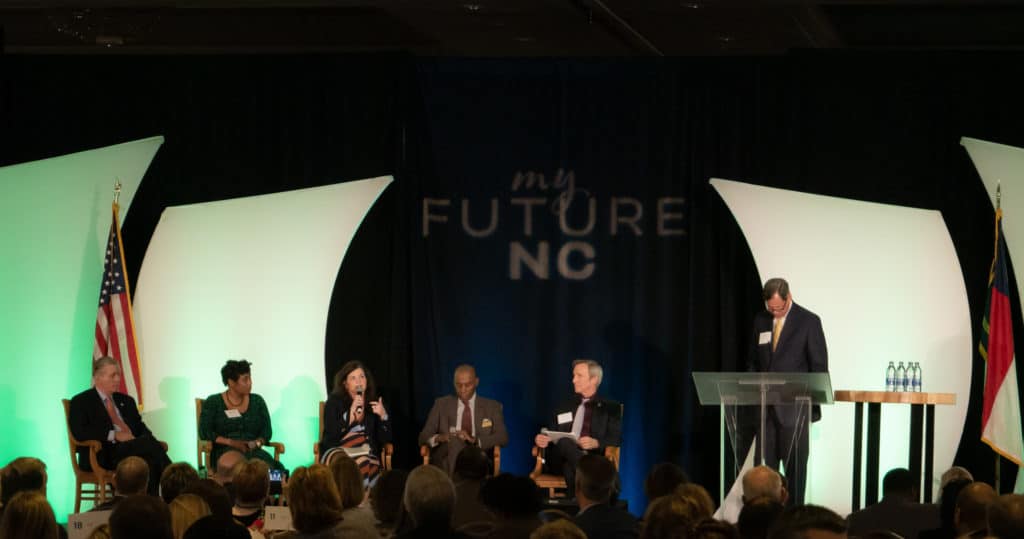

If you’re talking about community colleges and big pictures, you can boil it down a great deal to recruit, retain, and complete. If we’re going to meet the myFutureNC goal, we have to recruit students in, we have to retain and educate them, and get them to complete.
One thing we’ve done here at Isothermal is create Fast Track programs. These programs are flexible adult study tracks, which are eight-week programs, not 16 weeks. Somewhat like early colleges, we pack more into a shorter period of time. It’s the same amount of instruction, but it’s in a shorter period of time.
If you think about a community college student, particularly during COVID, they may be working jobs, or they get halfway through a semester and something happens and they have to drop out. They have family obligations, or COVID gets in the way. With fast track programs, students can come in and complete whatever courses they’re taking in a shorter period of time, and they get that sense of success, completion, and they’re more likely to be retained and complete with us.
There are also things we need immediately in the community college system:
We’ve got to address the pay issue. We are in the bottom quartile in the SREB (Southern Regional Education Board). SREB is at the bottom of all regions in pay. If we say that we have the best community college system, and I think we do, we are going to have to pay instructors and staff enough to keep them there. It’s a great investment to do that.
That also leads to the need for leadership development. The baby boomers and a lot of the baby echoes are now retiring. And you’re only going to be as good as your leaders. I was at a seminar one time sponsored by SREB. I served on their board for a while. Virginia was presenting, and they had done some wonderful things. Somebody raised their hand and asked what policies they had put in place to accomplish these great things. The guy presenting thought a minute and said, “You know, I don’t think we put any policies in place. We found out that personnel is policy.” I love that. Personnel is policy. We get somebody that can do a job well, as you did when you were here, good things happen. Leadership development is going to be key to get good people into these positions going forward.
The other thing we need is more scholarship money. You hear a lot of discussion about free tuition at community colleges. I think that’s a good thing. I understand budgets, so you’ve got to make sure that you’re doing it in a responsible manner. But again, if you want to look at the future, look at history.
In the 20s and 30s, the Industrial Revolution was really beginning to rock and roll. And a lot of companies were saying, we need a better worker and they need to at least have a high school education. At that point in time, the 20s, 30s, and 40s, you had no free high school. States were not sponsoring that. But because of the market demand, very quickly everybody started offering high school – free education through high school so the business industry would have a better product.
What you hear from myFutureNC, and I agree with them, is that people need a high-quality degree or credential beyond high school. If you fully expect that, if it’s important for the economy, if we’re going to succeed, and if we’re going to compete in the global economy, then we need to give incentives and make that pathway as easy as we can for people to enroll, which compared to history, would mean free tuition. Again, if not free tuition, we need more scholarships to encourage people and ease their financial burden to get that credential or degree.
ET: Talk to me about your lifetime of public service. What motivated you to choose the path of public service?
WD: That’s a good question. My father had served in the North Carolina Senate. He actually was serving at the time I was born. I’ll give my age. I was born in 1949, so there’s a good reason to retire. But he did not seek reelection because he had a young baby, and he was 44. My mother was 40, and my sister was six and a half years older than I was. So I don’t think they expected me. But he decided not to seek reelection.
He was very involved in politics even after that and had opportunities to go to Raleigh on more than one occasion but chose to stay home. In 1957, he passed away of a heart attack during the night. I was only eight years old at the time. But I remember his Senate picture was still hanging in the hallway, and I would ask my mother, “What was that?” And at a young age, you don’t understand the difference between the U.S. Senate or the North Carolina Senate, but as I got older, I understood that.
When I was an attorney, I was asked to speak at an occasion. It was a reunion type of thing in the area of Rutherford County. During that, somebody came up to me and said, “I just want you to know that your father helped us get our road paved. Nothing made more difference in my life than that road getting paved.” And this was 25 years or more following my father’s service.
I thought that was impactful. I mean, here I am years beyond that. I didn’t know anyone would remember my dad that much, but this person said it really had an impact on their life. And because of his involvement, people would approach me about serving in different capacities. I was recruited two or three times to run for the legislature, but my children were young and I grew up without my father. My mother and sister did a really good job, and the community got behind me and kind of raised me.
But as I got older and the opportunities presented, I ran for the North Carolina Senate. My daughter was finishing high school, and I knew she was going to [University of North Carolina at Chapel Hill]. So I thought, well, I’ll be in Raleigh too. I may miss a little bit of her high school, but I’ll get more of her college.
If you really think about it, people wouldn’t believe that being a lawyer is really serving people, but it is. You’re representing your clients, and you’re trying to make their life better in whatever way, whether it’s estate planning, buying a house, or representative in court. So this was a way to take it to a bigger scale, and then the lieutenant governor’s position was the perception that it would take that to an even bigger scale.
I’ve always enjoyed public service. I’ve enjoyed working for other people — working for the people. And again, trying to make their life better.
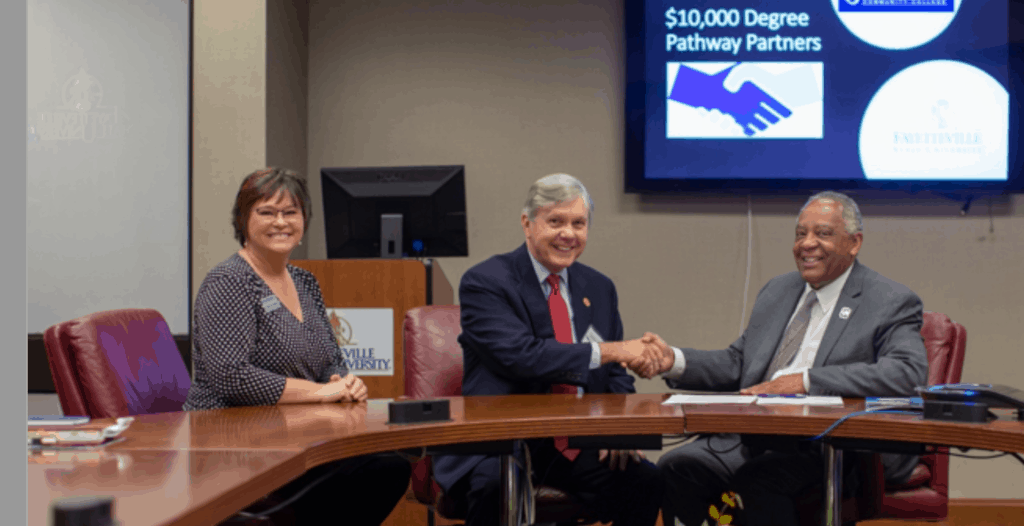

ET: I know how important it is to have a support system. Tell me about the role your wife, Lucille, played in your career.
WD: A tremendous amount. I can’t begin to tell you how important she has been. Serving in public life is not easy. Campaigning is not easy. You’ve got to have someone you can lean on — to tell you to get up and get at it, or understand and calm the stormy waters.
She’s a great sounding board. She’s got a great head on her shoulders. She would engage with debate as much as anything in the car going up and down the road. She was involved in politics before I was. She was appointed to the Rutherford County School Board, and she was the first female Chair of Rutherford County School Board and did a lot of things — a great building program and more diversity came on that board under her leadership. One year she was named the number one school board member in North Carolina by the School Board Association.
I am really proud of her involvement in politics. In fact , we were on the ballot together once or twice. Now that got a little hairy. You saw Dalton signs everywhere, particularly in Rutherford County. Some were her signs, and some were my signs. We made sure the color schemes were right so we were helping each other in that fashion. But that was extremely challenging to be on the ballot at the same time and watching the returns together. Thank goodness in those elections we both won. But she is phenomenal.
It’s a sacrifice for the family, for the children, too. They enjoyed being involved in the political process to a degree, but it takes time away from family. I can’t tell you how many times that happy birthday was sung to Lucille at some kind of campaign event. I think when I was campaigning for governor she got happy birthday four times in one day. Anyone who leads has to have some kind of support system. And I think in a lot of instances that will be your spouse — the person that is closest to you.


